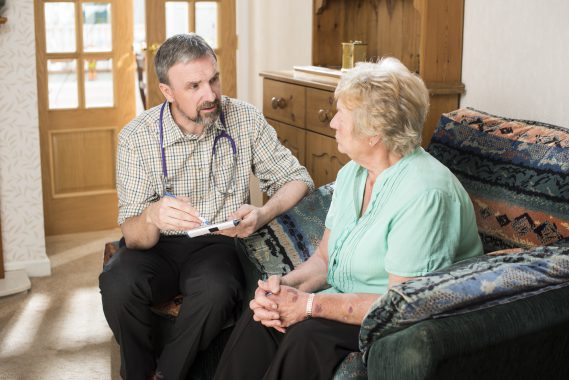GPs asked to set up dedicated home-visiting team for ‘shielded’ patients

GP practices should put together a dedicated home-visiting team for patients who are most vulnerable to complications from coronavirus (Covid-19), NHS England has said.
It said said that ‘if possible’, the team visiting the patients who have been advised to ‘shield’ should comprise of staff members who have not been exposed to patients with virus symptoms.
In a bulletin to practices sent last night, NHS England said it ‘wanted to clarify the situation for face-to-face assessment for shielded patients’.
It said: ‘If possible, a dedicated home visiting team for shielded patients should be set up, with staff who are not seeing patients with symptoms of Covid-19.
‘Where this is not possible, shielded patients should be seen either in designated sites or by routine home visits, depending on the local model.
‘Infection prevention and control guidance, including appropriate use of PPE should be followed at all times.’
The new guidance forms part of an updated standard operating framework for general practice during Covid-19.
It comes as two weeks ago, NHS England told GPs that they should review 1.5 million patients identified by NHS England as the most vulnerable to Covid-19.
NHS England was to send a standard letter to these patients asking them to stay at home at all times and avoid any face-to-face contact for at least 12 weeks.
But since then GPs have reported being contacted by patients who are concerned they fall into the highest risk category, but have not received a letter from NHS England.
Yesterday, Pulse reported that NHS England was still in the process of using primary care data to add more patients to its list of clinically most vulnerable patients.
It asked practices to wait until all the NHS England letters had been sent out – which will be flagged on GPs’ digital patient records – before they themselves conduct a further search for missed-off patients.
Patients who have been asked to shield to avoid coronavirus
1. Solid organ transplant recipients
2. People with specific cancers
• People with cancer who are undergoing active chemotherapy or radical radiotherapy for lung cancer
• People with cancers of the blood or bone marrow such as leukaemia, lymphoma or myeloma who are at any stage of treatment
• People having immunotherapy or other continuing antibody treatments for cancer
• People having other targeted cancer treatments which can affect the immune system, such as protein kinase inhibitors or PARP inhibitors.
• People who have had bone marrow or stem cell transplants in the last 6 months, or who are still taking immunosuppression drugs.
3. People with severe respiratory conditions including all cystic fibrosis, severe asthma and severe COPD
4. People with rare diseases and inborn errors of metabolism that significantly increase the risk of infections (such as SCID, homozygous sickle cell disease)
5. People on immunosuppression therapies sufficient to significantly increase risk of infection
6. People who are pregnant with significant heart disease, congenital or acquired
Source: NHS England
Pulse October survey
Take our July 2025 survey to potentially win £1.000 worth of tokens

Visit Pulse Reference for details on 140 symptoms, including easily searchable symptoms and categories, offering you a free platform to check symptoms and receive potential diagnoses during consultations.










